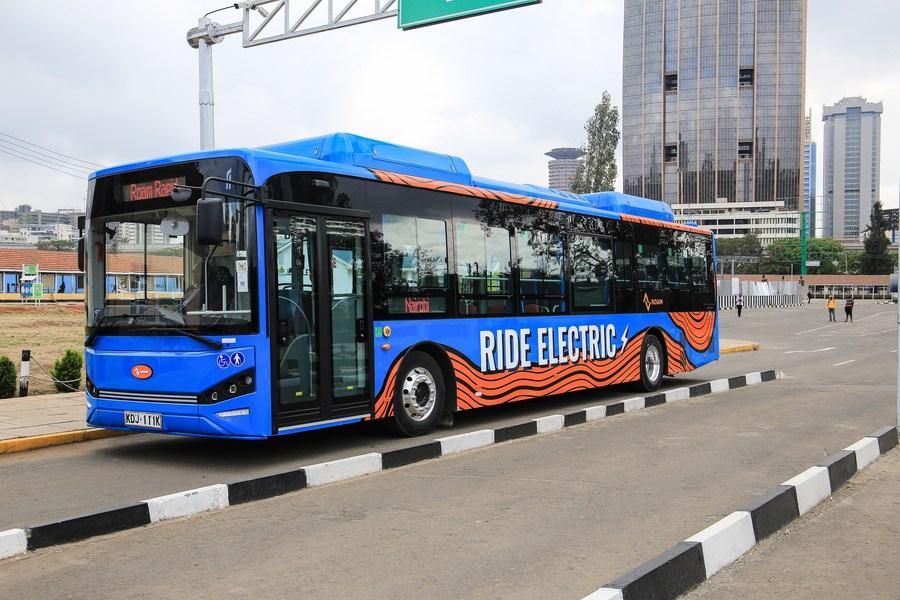
 0 Comment(s)
0 Comment(s) Print
Print E-mail Xinhua, March 3, 2024
E-mail Xinhua, March 3, 2024

An electric bus is seen in Nairobi, capital of Kenya, on Oct. 19, 2022. (Photo by Charles Onyango/Xinhua)
The transition to green mobility, which promotes ecosystem and human health in urban centers, has accelerated, thanks to the greater availability of Chinese-manufactured new energy vehicles, said experts at the sixth session of the United Nations Environment Assembly (UNEA-6), which concluded Friday in Nairobi, the Kenyan capital.
China has played an immense role in helping developing countries, the majority in Africa, to adopt electric mobility in cities and reduce their carbon footprint, said Ali Mohamed, Kenya's special climate envoy based at the President's office, Thursday.
According to Mohamed, China is the source of nearly all electric vehicles plying Kenyan roads, aiding the quest for the transition to carbon-free mobility alongside boosting air quality. "We seek partnership to help achieve our e-mobility aspirations, and China has come on board as a crucial partner. We are importing both the new energy vehicles from China and vital parts like charging batteries," Mohamed said.
He said that Kenya has enacted a supportive policy and regulatory framework to spur the growth of electric mobility besides investing in local assembling plants for new energy vehicles such as buses, and two- and three-wheelers.
Data from the China Association of Automobile Manufacturers shows that exports of China's new energy vehicles (NEVs), including both pure electric and hybrid vehicles, soared 77.6 percent to more than 1.2 million units in 2023.
Additionally, BYD, a Chinese electric vehicle brand, became the world's largest pure electric vehicle manufacturer in the fourth quarter of 2023.
Moses Nderitu, the managing director of BasiGo, a Kenyan early-stage e-mobility start-up, believes that the East African country's leap to green mobility has a promising future, thanks to the partnership with China.
"I think China is making an immense global contribution to green mobility, and here in Kenya, we are feeling the impact. Nearly all the new energy models we have on our roads are imported from China," Nderitu said.
China's new energy industry has seen robust growth in recent years, becoming a new bright spot in the wide economic picture. Amid the surge in the number of electric vehicles cruising the roads worldwide, China has ranked first globally in NEV sales for the past nine consecutive years, with a share of the global market at more than 60 percent.
Nderitu said that BasiGo not only imports new energy vehicles from China but also the batteries that are powering them, adding that local travelers have embraced electric vehicles given their comfort and pollution-free status.
Chinese technology is enhancing Kenya's transition to green mobility, though authorities should invest more in charging infrastructure and roll out subsidies for imported parts, Nderitu stressed.
As the first company to launch electric buses in Kenya, BasiGo assembles them locally using parts designed by BYD. Nderitu said that under the partnership with BYD, BasiGo has managed to put 17 electric buses on Nairobi roads, boosting the transition to much-needed green mobility in East Africa's largest economy.
Experts said Chinese technologies and advanced production prowess for crucial parts like batteries, motors and intelligent cabins will sustain its stewardship in electric vehicle manufacturing and export.
Rob De Jong, head of Sustainable Mobility at the United Nations Environment Program, said that China is a leader in electrification and the promotion of electric vehicles. He hopes that China will share its experience with the world, especially the Global South, and its technology to promote affordable electric vehicles around the world.
Kenya's integration into the international electric vehicle supply chains has succeeded thanks to the partnership with China, said Nzambi Matee, a Nairobi-based woman green innovator. Matee, who was among the seven winners of the 2020 UN Young Champions of the Earth Award, said that going forward, Kenya should enhance technology and skills exchange with China to grow the nascent local electric vehicle industry.
"Let us establish a partnership framework with China to have more of these new energy vehicles assembled locally. As for me, partnership with China should be long-term to scale up e-mobility in the country," Matee said.
Go to Forum >>0 Comment(s)